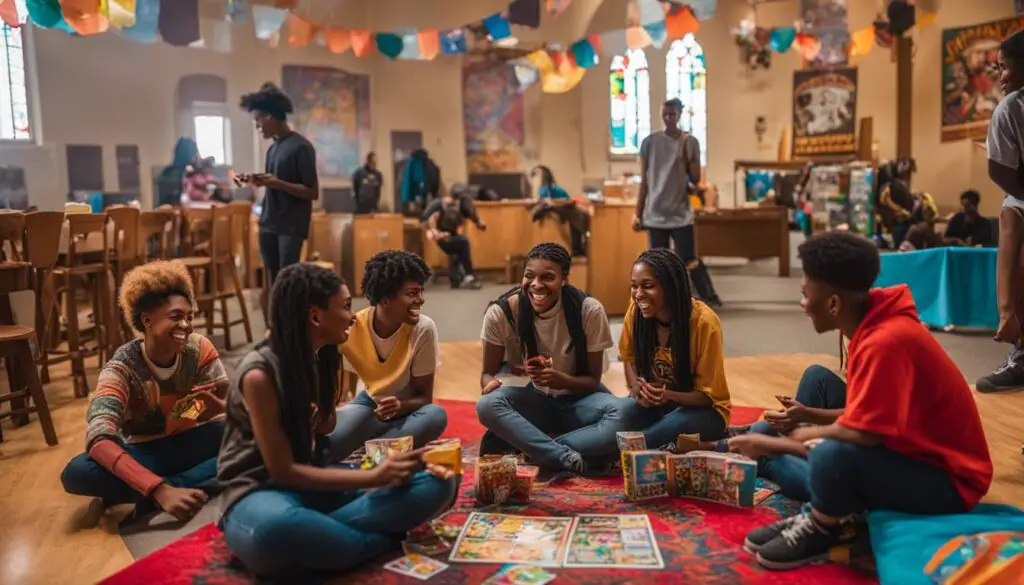Planning a successful and engaging church youth day program is crucial for fostering faith and community among young believers. By incorporating various activities and strategies, you can create a vibrant youth ministry that leaves a lasting impact on the participants. Let’s explore some inspiring ideas and tips to make your church youth day program enjoyable and meaningful.
Key Takeaways:
- Plan activities and strategies to create an engaging church youth day program.
- Foster faith and community among young believers through meaningful engagement.
- Empower youth through education and active learning.
- Build meaningful relationships and create a sense of belonging.
- Design worship experiences that are relatable and meaningful for youth.
Honoring the Spirituality of Youth
One key aspect of an engaging church youth day program is to honor the spirituality of youth. Recognize young people as individuals with sacred worth and legitimate spiritual needs. Encourage them to actively participate in ministry, rather than just being the recipients of ministry. Seek their input and feedback to understand their needs and how the church can support their spiritual growth. Emphasize the importance of youth involvement in all aspects of church life.
Nurturing Authentic Faith
In order to honor the spirituality of youth, it is essential to create a safe and welcoming space where young people can explore and develop their authentic faith. The church’s youth ministry program should prioritize the nurturing of genuine connections with God and encourage youth to ask questions, doubt, and critically engage with their beliefs. By fostering an environment that values open dialogue and personal exploration, the church can support the spiritual development of its young members.
“By engaging with young people’s individual spiritual journeys, we can create a space where they feel heard, valued, and empowered in their faith.”
Empowering Youth as Spiritual Leaders
An effective church youth day program goes beyond providing spiritual guidance; it also empowers youth to become active participants and leaders in their spiritual journey and the larger church community. Encourage youth to explore their spiritual gifts and talents and provide opportunities for them to use these gifts in ministry. This may include leading worship, organizing outreach events, or participating in mission trips. By empowering youth as spiritual leaders, the church acknowledges their unique perspectives and contributions, fostering a sense of ownership and responsibility in their faith.
Building supportive relationships is crucial in honoring the spirituality of youth. Youth ministry programs should prioritize fostering genuine connections and creating a supportive network within the church community. Encourage mentorship relationships between older members of the congregation and youth, providing guidance and support to navigate the challenges and questions that arise on their spiritual journey. Organize small groups or discussion circles where youth can connect with peers who share similar beliefs and experiences. By fostering a supportive network, young people can feel seen, understood, and supported on their spiritual path.
Ensuring Inclusivity
To truly honor the spirituality of youth, it is vital to ensure inclusivity within the church community. Create an environment that embraces diversity and welcomes young people from all backgrounds, cultures, and identities. Avoid judgment or exclusion based on external appearances or past experiences. Celebrate the unique gifts and perspectives each young person brings, fostering an atmosphere of acceptance and belonging. By demonstrating inclusivity in the church youth day program, the church upholds the spirit of Christ’s teachings and creates a space where every youth can thrive spiritually.
Empowering Youth through Education
In order to empower and encourage the growth of youth in the church, education plays a pivotal role. By providing a comprehensive curriculum and engaging activities, we can address the relevant questions and challenges faced by young people, while deepening their faith and fostering their spiritual development.
One crucial aspect of youth education is creating discussions and activities that encourage exploration and critical thinking. By engaging them in conversations about their faith, we provide opportunities for them to explore their beliefs and develop a deeper understanding of spirituality.
It is also crucial to approach sensitive topics, such as sexuality, with respect and sensitivity. By providing informative and open discussions, we can create a safe space for youth to learn and ask questions, empowering them to make informed decisions and develop a healthy understanding of their bodies and relationships.
Another way to empower youth is by involving them in planning and leading mission activities. By giving them responsibilities and opportunities to contribute, we instill a sense of ownership and purpose, allowing them to grow in their leadership skills and commitment to the church.
Training in spiritual disciplines, such as prayer and Scripture reading, is also essential for youth’s spiritual development. By teaching them these practices, we equip them with tools to deepen their connection with God and strengthen their faith.
Lastly, creative approaches can make education more engaging and exciting for youth. Rewriting hymns or prayers with modern lyrics or incorporating multimedia elements can capture their attention and provide a fresh perspective on faith and spirituality.

Empowering youth through education not only helps them grow in their faith but also equips them with the knowledge and tools to navigate the complexities of the world. By investing in their education, we nurture their spiritual growth and encourage them to become active and engaged members of the church community.
Building Meaningful Relationships
Youth ministry is all about building relationships. It’s important to create a sense of belonging for youth by integrating them into the larger church community. By encouraging inclusiveness and acceptance among peers, we can combat cliquishness and foster an environment where everyone feels valued and accepted.
One effective way to build relationships is through retreats and mission trips. These experiences provide opportunities for sustained interaction and group cohesiveness. When youth come together for a common purpose, they form bonds that can last a lifetime.
Engaging in activities that help youth develop a sense of competence and accomplishment also plays a significant role in building meaningful relationships. Whether it’s participating in community service projects or taking on leadership roles, these experiences empower young individuals and strengthen their connection to the church.
Additionally, providing leadership opportunities for as many youth as possible is crucial. By giving them a platform to lead, we empower them to take ownership of their faith and develop valuable leadership skills.
It’s important to recognize the impact of parents in nurturing their children’s faith. Supporting parents and equipping them with resources and guidance will strengthen the bonds within families and the larger church community as a whole.
“Belongingness and connection are fundamental needs for every individual, especially the youth. By building meaningful relationships, we create a space where they feel seen, heard, and loved.” – Pastor Mark Thompson
By prioritizing relationships in our church youth program, we can create a vibrant and nurturing environment where young people can truly grow in their faith.
The Impact of Inclusivity
Inclusivity is a key aspect of building meaningful relationships within the church youth group. When every young person feels welcomed and accepted, they can fully engage in the community and experience the transformative power of faith.
| Inclusivity Benefits | Actions to Foster Inclusivity |
|---|---|
| 1. Sense of Belonging | ▪ Encourage youth to reach out and welcome newcomers ▪ Establish a mentorship program pairing new youth with experienced members |
| 2. Increased Participation | ▪ Provide opportunities for youth to contribute their skills and talents ▪ Encourage youth to take on leadership roles within the youth group |
| 3. Diverse Perspectives | ▪ Create a safe space for open discussions and respectful dialogue ▪ Celebrate and embrace different cultures, backgrounds, and beliefs |
| 4. Stronger Community | ▪ Organize social events and outings for the entire youth group ▪ Encourage youth to support one another outside of church activities |
Through these actions, we can foster inclusivity and ensure that every youth feels valued, respected, and accepted as an integral part of the church community.

Making Worship Meaningful for Youth
Worship is an essential element of any church youth day program. It provides an opportunity for young people to connect with their faith and experience a sense of spiritual fulfillment. To ensure that worship is meaningful for youth, it is important to create an environment that resonates with them and encourages their active participation.
One effective way to engage youth in worship is to give them meaningful and visible roles as worship participants. This could include leading prayers, reading scripture, or sharing personal testimonies. By involving youth in these roles, they feel valued and connected to the worship experience.
A great way to make worship more relatable to youth is by incorporating elements from popular culture. This could involve using contemporary music that they can relate to, incorporating movie clips that convey powerful messages, or even referencing popular books or TV shows that highlight spiritual themes. By integrating these familiar elements, youth are more likely to connect with and engage in worship.
Another approach to making worship meaningful for youth is to encourage them to write liturgies or prayers that reflect their own perspectives and experiences. This allows them to express their thoughts and emotions in a way that feels authentic and personal. By giving youth a platform to share their unique voices, the worship experience becomes more inclusive and relevant.
Creating a worship environment that fosters a sense of connection with God is crucial. This can be achieved through the use of meaningful symbols, visuals, and rituals. For example, incorporating artwork depicting biblical stories or displaying lit candles can help create a sacred atmosphere. Additionally, using interactive elements such as prayer stations or guided meditations can help youth actively engage with their spirituality.
To visually reinforce the importance of making worship meaningful for youth, here is an image:

In conclusion, making worship meaningful for youth is essential in a church youth day program. By giving youth meaningful roles, incorporating elements from popular culture, encouraging their active participation, and creating a worship environment that fosters a sense of connection with God, you can create a worship experience that resonates with young people and cultivates their spiritual growth.
Creating Engaging Youth Fellowship Activities
Youth fellowship activities are a great way to promote engagement and participation within your church youth group. These activities not only provide a sense of fun and excitement but also foster a sense of community and belonging among young believers.
Here are some tips to help you create engaging and meaningful youth fellowship activities:
- Establish a sense of routine: Be consistent with meeting times and locations to create a sense of familiarity and routine for the youth. This consistency helps them feel secure and committed to the fellowship.
- Consider age-appropriate activities: Junior high and senior high youth have different interests and abilities. Consider dividing them into separate groups to provide age-appropriate activities that cater to their specific needs and preferences.
- Involve youth in the planning process: Give young people an opportunity to have a say in the activities they participate in. By involving them in the planning process, you empower them to take ownership of the fellowship and increase their engagement.
- Offer a balance of recreation, study, devotion, and fellowship: Ensure that your youth fellowship activities include a variety of elements. Balance recreational activities, such as games and outings, with study sessions that delve into relevant topics of faith and devotion. Encourage fellowship and bonding among the youth by providing opportunities for open and meaningful conversations.
- Schedule big events regularly: Plan and schedule big events, such as youth retreats or service projects, on a regular basis. These events serve as highlights within the fellowship and create excitement among the youth. Encourage the youth to invite their friends to these events, broadening the community’s reach.
- Establish clear behavior boundaries and discipline policies: Set clear behavior boundaries and expectations for the youth fellowship activities. Ensure that everyone understands and respects these boundaries. Have a discipline policy in place to address any misconduct appropriately and maintain a safe and inclusive environment for all participants.
By following these tips, you can create engaging youth fellowship activities that not only provide entertainment but also promote personal growth, spiritual development, and a strong sense of community among the church youth group.
Example of Youth Fellowship Activities Schedule
| Activity | Date | Time |
|---|---|---|
| Outdoor Scavenger Hunt | April 10 | 2:00 PM – 5:00 PM |
| Bible Study: Exploring Faith Questions | April 17 | 7:00 PM – 9:00 PM |
| Youth Retreat: Building Strong Foundations | April 23-25 | All Day |
| Service Project: Community Cleanup | May 1 | 9:00 AM – 12:00 PM |
| Movie Night & Pizza Party | May 8 | 6:30 PM – 9:30 PM |

Engaging Youth through Physical Activities
Physical activities are a great way to engage youth and channel their energy. By incorporating exciting and interactive games, you can create an environment that promotes teamwork, competition, and personal growth.
One popular game that sparks enthusiasm is life-size Tic Tac Toe. Create a giant grid using ropes or tape, and have teams strategically place themselves as X’s and O’s. This game not only encourages problem-solving but also fosters collaboration and strategic thinking.
Another thrilling activity is the bank robbery game. Divide youth into teams and assign each team a role, such as robbers or investigators. Set up a scenario where robbers have to execute their plan and investigators have to track them down. This game enhances critical thinking, communication, and teamwork skills in a thrilling and dynamic way.
To add a touch of creativity, consider organizing the Worm Olympics. In this playful event, youth can showcase their physical abilities through fun and engaging worm-inspired challenges. From worm races to worm-themed obstacle courses, these activities provide entertainment while promoting teamwork, friendly competition, and creativity.
| Game | Description | Benefits |
|---|---|---|
| Life-size Tic Tac Toe | Teams strategically place themselves as X’s and O’s on a giant grid. | Promotes problem-solving, collaboration, and strategic thinking. |
| Bank Robbery | Teams simulate a bank robbery scenario with robbers and investigators. | Enhances critical thinking, communication, and teamwork skills. |
| Worm Olympics | Challenges inspired by worms, such as races and obstacle courses. | Encourages teamwork, creativity, and friendly competition. |
Engaging youth through physical activities not only provides entertainment but also cultivates important life skills. These games and challenges not only build physical strength but also foster teamwork, problem-solving, and healthy competition among the participants.
Inspiring Creativity through Artistic Activities
Artistic activities can play a significant role in nurturing creativity and self-expression among youth. By encouraging young people to engage in hands-on projects that combine artistry with themes of faith and love, you provide them with valuable opportunities to explore their creative abilities and deepen their connection with their spirituality.
Consider incorporating activities such as yarn-wrapped cardboard letters or creating woolen hearts, where youth can unleash their artistic talents while simultaneously reflecting on the profound concepts of faith and love. These projects enable young individuals to express themselves in unique and meaningful ways, fostering personal growth and a deeper understanding of their faith.
Unleashing Artistic Potential
Artistic activities allow youth to explore their innate creative abilities and unlock their full potential. Through these activities, they can express their thoughts, feelings, and personal beliefs in imaginative and innovative ways. By engaging in artistic projects, such as painting, sculpting, or writing, young people can tap into a wellspring of inspiration and develop skills that extend beyond the physical act of creation.
“Art enables us to find ourselves and lose ourselves at the same time.” – Thomas Merton
This quote by Thomas Merton beautifully captures the transformative and cathartic nature of artistic endeavors. Through art, youth can discover aspects of themselves, transcend their everyday experiences, and engage in personal reflection. By embracing artistic activities within the church youth program, you empower young individuals to embark on a journey of self-discovery and spiritual growth.
Fostering Self-Expression and Faith Reflection
Artistic activities provide a unique platform for youth to express their thoughts, emotions, and spiritual insights. Whether it’s through visual arts, music, dance, or creative writing, young individuals can convey their interpretations of faith and explore their personal relationship with God.
Engaging in artistic activities nurtures creativity and self-expression among youth.
By offering opportunities for artistic expression, you encourage youth to think critically about their faith and its relevance in their lives. Through their creations, they can engage in a deep and meaningful conversation with themselves, their peers, and their spiritual mentors.
Embracing Diversity through Art
Artistic activities have the power to bring people from different backgrounds and experiences together. By encouraging youth to explore various artistic mediums and styles, you foster an environment that celebrates diversity and encourages unity. Through shared creative experiences, young individuals can discover the beauty in different perspectives and learn to appreciate the richness of their collective faith.
Moreover, artistic activities can help bridge communication gaps and facilitate meaningful connections within the church youth group. By creating collaborative art projects or organizing artistic exhibitions, you provide opportunities for young people to work together, learn from one another, and build lasting friendships based on shared passions and common goals.
Artistic activities are an invaluable tool for inspiring creativity, nurturing self-expression, and deepening the connection between youth and their faith. By incorporating these activities into your church youth program, you empower young individuals to explore their artistic potential, reflect on their spirituality, and forge meaningful connections with their peers and mentors.
Nurturing Spiritual Growth through Active Learning
Active learning is a vital component when it comes to nurturing the spiritual growth of youth in the church. By using engaging and interactive approaches, we can help young people deepen their understanding of Christianity and develop a personal connection with their faith.
One effective method is the one-verse Bible study, where we focus on diving deep into specific scriptures and exploring their practical applications in our daily lives. This approach encourages youth to reflect on the relevance of biblical teachings and how they can impact their choices and actions.
A key aspect of active learning is providing a safe space for open discussion, where youth can freely ask questions and express their doubts. By fostering an environment of trust and understanding, we enable young people to grapple with complex issues and gain a clearer understanding of their faith.
Prayer meetings are another powerful way to engage youth in active learning. These gatherings allow them to share their thoughts, concerns, and experiences with one another. In these intimate settings, young people can grow spiritually by supporting and encouraging each other in their faith journeys.
To help youth connect their faith with real-life issues, we can incorporate activities like discussing YouTube clips or news articles that highlight topics relevant to their lives. By exploring the connection between faith and these issues, young people can understand how their beliefs can shape and guide their actions in a meaningful way.
“Active learning encourages youth to apply their faith to relevant situations and deepens their understanding of Christianity.”
By nurturing spiritual growth through active learning, we empower young people to develop a personal and dynamic relationship with their faith. It fosters critical thinking, reflection, and a genuine understanding of how their beliefs can shape their lives. Through these engaging approaches, we can inspire and guide the next generation of believers on their spiritual journey.
Key Takeaways:
- Use one-verse Bible study to delve into specific scriptures and their potential applications.
- Encourage open discussion and provide a safe space for youth to ask questions and express their doubts.
- Engage in prayer meetings where youth can share their thoughts and concerns.
- Explore the connection between faith and real-life issues through activities like discussing YouTube clips or news articles.
Supporting Parents in Nurturing Youth Faith
Supporting parents in nurturing their children’s faith is crucial for the success of a church youth day program. As parents play a fundamental role in shaping their children’s spiritual journey, it is essential to provide them with the resources and guidance they need to practice faith at home.
- Encourage parents to pray together as a family, fostering a sense of unity and spiritual connection.
- Offer guidance on observing Christian holidays, allowing parents to engage their children in traditions that reinforce faith values.
- Create parenting support groups where parents can find encouragement and learn from one another’s experiences in raising children of faith.
- Provide resources on family concerns, addressing topics such as navigating challenges and instilling strong moral values in children.
- Emphasize the importance of parents’ own faith formation, as their involvement and commitment to their own faith positively influence their children.
- Encourage parents to spend quality time with their children, engaging in activities that build strong relationships centered around faith.
“Children are the greatest imitators, so give them something great to imitate.” – Anonymous
By supporting parents in nurturing their children’s faith, you create a foundation for their spiritual growth within the church youth day program. Together, parents and the church can inspire and guide young believers on their journey of faith.
| Benefits of Supporting Parents | How Parents Can Be Supported |
|---|---|
| 1. Strengthening the bond between parents and children | 1. Offering parenting support groups |
| 2. Creating a cohesive approach to faith at home and in the church | 2. Providing resources on practicing faith |
| 3. Instilling lifelong spiritual values in children | 3. Encouraging parents’ active involvement in their own faith formation |
| 4. Nurturing a sense of belonging within the church community | 4. Organizing family-focused events and activities |
By investing in the spiritual growth of both youth and their parents, a church youth day program becomes a powerful tool for nurturing faith, fostering a sense of community, and creating a lasting impact on young believers.
Conclusion
Engaging youth in the *church youth day program* is a dynamic endeavor that requires intentional planning, creativity, and a commitment to meeting their needs. By honoring their spirituality, empowering them through education, and building meaningful relationships, you can create a vibrant and impactful youth ministry. Additionally, creating engaging worship experiences and providing opportunities for fellowship and growth further enriches their faith journey.
It is essential to support parents in nurturing their children’s faith and encourage their active involvement in the church community. By working together, we create an environment where youth feel a sense of belonging and are supported in their development.
The *church youth day program* is more than just an event; it is a celebration of faith, community, and lifelong spiritual growth. Through intentional efforts to engage youth, we can foster deep connections, inspire their passion for God, and equip them to make a meaningful impact on the world.
FAQ
How can I create an engaging church youth day program?
To create an engaging church youth day program, it’s important to honor the spirituality of youth, empower them through education, build meaningful relationships, make worship meaningful to them, provide engaging youth fellowship activities, incorporate physical activities, inspire creativity through artistic activities, nurture spiritual growth through active learning, and support parents in nurturing their children’s faith.
What should I consider when planning a church youth day program?
When planning a church youth day program, it’s important to consider the spiritual needs of young people, involve them in ministry, address relevant questions and challenges they face, build a sense of belonging within the church community, give them visible roles in worship, create a variety of engaging activities, promote teamwork and healthy competition, and provide opportunities for creative self-expression and active learning.
How can I involve youth in ministry?
To involve youth in ministry, encourage their active participation and seek their input and feedback. Involve them in planning and leading mission activities, provide training in spiritual disciplines, and offer leadership opportunities. Emphasize the importance of their involvement in all aspects of church life.
How can I make worship meaningful for youth?
To make worship meaningful for youth, give them meaningful and visible roles as worship participants. Design worship experiences that resonate with young people and incorporate elements from popular culture. Encourage youth to write liturgies or prayers that reflect their perspectives and create a worship environment that fosters a sense of connection with God.
What are some examples of engaging youth fellowship activities?
Engaging youth fellowship activities can include recreational, study, devotion, and fellowship activities. Examples include retreats, mission trips, game nights, Bible studies, service projects, and regular meetings that provide a balance between different types of activities.
How can I engage youth through physical activities?
To engage youth through physical activities, organize games that involve teamwork and competition, such as life-size Tic Tac Toe or bank robbery. You can also create creative activities like the Worm Olympics, where youth can showcase their physical abilities in a fun and engaging manner.
How can artistic activities nurture creativity among youth?
Artistic activities can nurture creativity among youth by allowing them to engage in hands-on projects that reflect on themes of faith and love. Encourage youth to create art projects like yarn-wrapped cardboard letters or woolen hearts, giving them a chance to explore their artistic abilities and connect with their faith on a deeper level.
How can I nurture spiritual growth through active learning?
To nurture spiritual growth through active learning, engage youth in approaches like one-verse Bible study, open discussion, and prayer meetings. Explore the connection between faith and real-life issues through discussions of YouTube clips or news articles. These activities help youth apply their faith to relevant situations and deepen their understanding of Christianity.
How can I support parents in nurturing their children’s faith?
To support parents in nurturing their children’s faith, provide resources and guidance on practicing faith at home, such as praying together as a family or observing Christian holidays. Offer parenting support groups and resources on family concerns. Encourage parents to spend quality time with their children, building strong relationships centered around faith.



“Hello there! I recently noticed that you’ve taken the time to visit my website, and I wanted to express my gratitude by returning the favor. As I’m constantly seeking ways to improve my site, I believe it would be beneficial to incorporate some of your ideas into my design and content strategy. Your input would be greatly appreciated, and I’m open to any suggestions you may have. Thank you for your interest, and I look forward to hearing from you!”
Certainly! Here’s an extended version of the message:
As fellow creators and enthusiasts, we can learn so much from each other. Whether it’s sharing ideas, providing feedback, or simply enjoying each other’s content, I believe that together, we can create something truly remarkable.
You’re welcome! Thank you for your understanding. If you have any specific questions, topics, or areas of interest you’d like to explore, feel free to share them. Whether it’s about technology trends, scientific discoveries, literary analysis, or any other subject, I’m here to provide information and assistance. Just let me know how I can assist you further, and I’ll be happy to help!
I sincerely enjoyed what you have produced here. The design is refined, your authored material trendy, yet you appear to have obtained a degree of apprehension regarding what you aim to offer next. Certainly, I shall return more frequently, just as I have been doing almost constantly, provided you uphold this incline.
You’re welcome! I appreciate your willingness to engage further. If you have any specific questions or topics you’d like to delve into, feel free to share them. Whether it’s about recent developments in technology, intriguing scientific discoveries, captivating literature, or anything else on your mind, I’m here to provide insights and assistance. Simply let me know how I can help, and I’ll be happy to assist you further!
What a fantastic resource! The articles are meticulously crafted, offering a perfect balance of depth and accessibility. I always walk away having gained new understanding. My sincere appreciation to the team behind this outstanding website.
Your blog is a testament to your passion for your subject matter. Your enthusiasm is infectious, and it’s clear that you put your heart and soul into every post. Keep up the fantastic work!
batmanapollo.ru
zd1kfn
Аттестация обучение охрана труда safetysystemsgroup.com
СОУТ — нужна почти на любом предприятии, где трудятся люди. Класс условий труда рабочих решается специальной компанией, которая находит его и нужность в компенсации трудящимся. Исследовательская лаборатория Safety Systems предлагает услуги по спецоценке условий труда, охране и безопасности на Вашем производстве.
Мы значимся независимой лабораторией, работаем исключительно на качество и хороший исход, применяя лучшие методики и современное оборудование. По оставшимся вопросам заходите на сайт safetysystemsgroup.com и смотрите новости.
По поиску услуги [url=https://safetysystemsgroup.com/ekologicheskie-izyskaniya/]проведение инженерно экологических изысканий[/url] обращайтесь в нашу организацию. Звоните по телефону +7(499)348-89-79 или подайте заявку обратный звонок. Наш профессиональный работник приедет к Вам и осуществит инструментальные измерения, сроком от 5ти рабочих дней. Наши основные услуги: производственный экологический контроль, инженерно экологические изыскания, обучение по охране труда и другие.
На веб ресурсе safetysystemsgroup.com Вы найдете отзывы наших заказчиков, также все требуемые документы на право проведения СОУТ, новости фирмы, контактная информация. Расположены по адресу офис: г. Москва, ул. Большая Почтовая 55/59, стр.1, оф. 549.
Помимо [url=https://safetysystemsgroup.com/ppk/]программа производственного контроля ппк[/url] у нас Вы найдете курсы по обучению в режиме онлайн по охране труда, пожарно-технический минимум, электробезопасность 3-я группа и другие. Свяжитесь с нами по вышеупомянутому телефону, адресу или закажите возвратный звонок. Будем рады сотрудничеству.